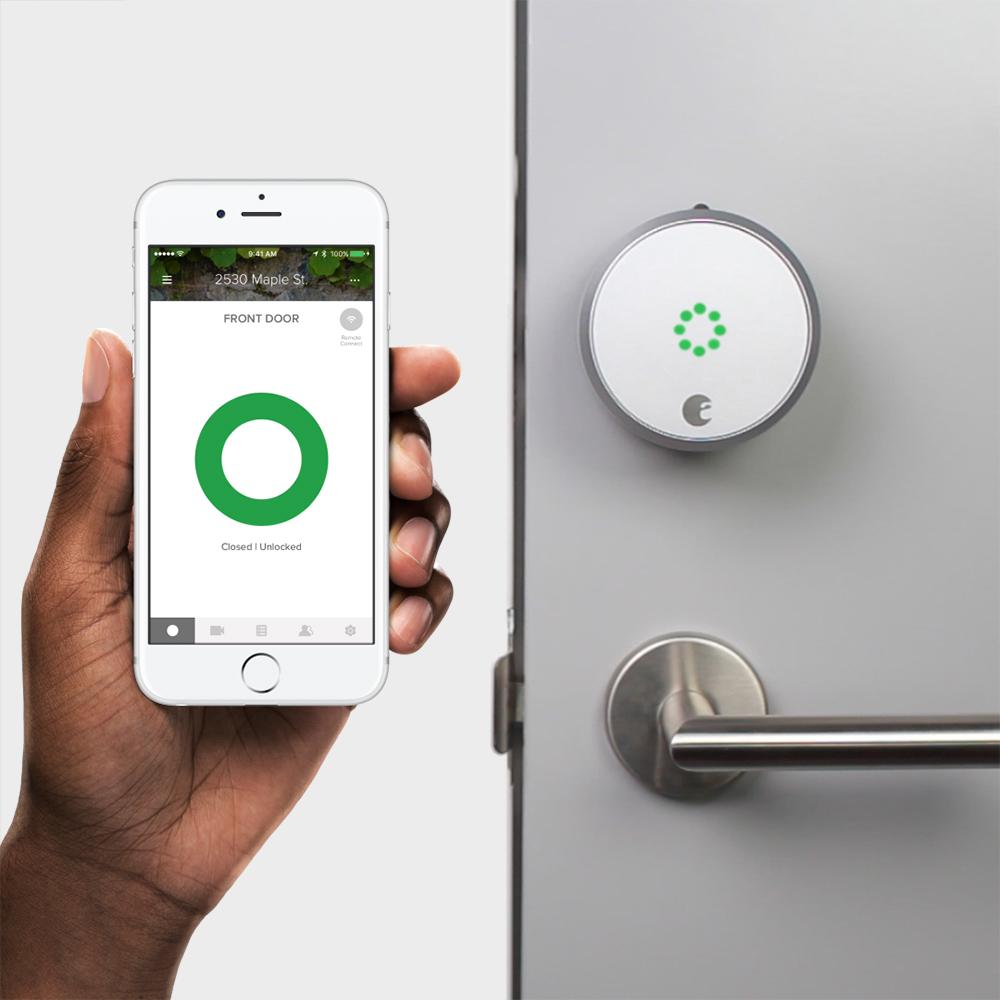
Amazon Prime Days are happening now, and I took the opportunity to pick up a little something for home security: an August Smart Lock (affiliate link for Prime Member deal). Smart locks and “Internet of Things” devices sometimes get a bit of a bad rap for security, but I thought you might be interested in some of my thought process and applying it to keep your own home safer and more secure.
The physical security that a door provides depends on the door itself. Large windows in doors may be attractive, and hollow-core interior doors are less expensive, but both are less resistant to someone forcing their way in than a solid door. Similarly, nearby window and, for interior doors, drywall, can often be easily broken through. The stoutest door in the world doesn’t matter then. Beyond that, the thing that keeps the door closed against an intruder is the lock. It’s important for that lock to be properly secured, so that a strong push to the door doesn’t bring the lock with it. It’s best here to use a sturdy deadbolt – look for ANSI Grade 1 or Grade 2 and a 1-inch bolt – with the side off the door (the strike plate) attached with long screws that make it through the decorative jamb around the opening and into the building frame itself. You might also want to choose a lock that is “bump-resistant” or “pick-resistant”, but it’s even more important to make sure you control who has keys and can make copies of them. One of the reasons I like the August is that I can choose my own deadbolt lock, install it properly, and simply attach the August to it.
If you live in an apartment, you might be required to leave keys on file with management or maintenance. Even if not, you might want to give access to your place when you aren’t there to other people, like pet-sitters or cleaning services. Maybe you like to leave a spare key with a friend or family member “just in case.” Every key that’s out there is another opportunity for that key to be used improperly or to be copied, so you’ll want to limit them as much as possible. One of the perks of a digital lock is that you can program in a series of unique access codes for each individual who might need access to your home, and disable them when they are no longer needed. That way, it matters less if a person gives out their code because you can make it stop working and not have to change how anyone else, including you, gets in. Smart locks can also make codes only work during specified times so, for instance, nobody can use your child’s code except between 3 and 5 on weekday afternoons.
A lock is useless if it’s never, well, locked. One of the points in favor of a smart lock is that certain brands will automatically lock the door behind you. While manual locks are capable of doing the same, the trick is being able to get back inside. Depending on brand and style, a smart lock can be unlocked with a numeric code, your phone, a key fob, or even your fingerprint. If you don’t have one of those with you, I’m not sure I can help you break into your own place. On the minus side, if a smart lock runs out of power, will it work? I like the August and similar styles for working with a physical key as a backup option. It does mean you have to have a key accessible just in case, but it’s also easier to default your door to locked and to get back in when you want.
The last consideration I thought of was how secure the lock itself was. I’ve used digital locks before that you program at its keypad, but smart locks are network-connected and use apps for control. That means my wireless network needs to be secure, along with any passwords for the app and other ways to control the lock. Specifics there are a bit beyond my scope today, but knowing to pay attention to those issues is a good start. I also wanted to balance that against the security benefits I’d get by having a smart lock. Knowing when the lock is opened and whose code was used is a big plus to me. The idea of being able to lock and unlock my doors with an app or by voice with a digital assistant like Alexa also has positives for making sure my doors are locked from no matter where I am, or opening them from anywhere inside if I need to let in police or emergency medical services. For me, those conveniences outweighed the risks that might be inherent in using an Internet-connected smart lock.
In any case, though, here’s the thing. If someone really wants to break into your home, they will. All of these measures protect against the “drive by” style of burglary or home invasion and against innocent mistakes. What you’re doing when you worry about doors and locks is making it harder for someone to get in, so that they instead decide to go somewhere else. Just like trying to be deselected by a mugger as you walk down the street, you’re trying to make your home look and act like it is more work and not worth the trouble of breaking in.




